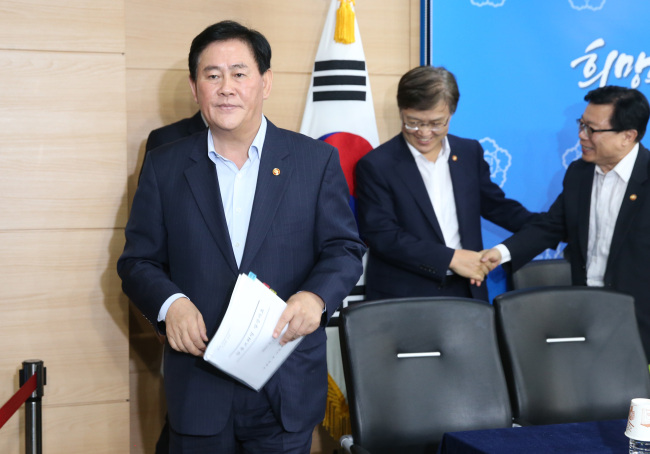The Korea Exchange appeared to be in a rare fix over the Finance Ministry’s intentions to ease carbon emission duties for companies in a move that would put a damper on gas trading aimed at reducing the nation’s carbon emissions.
The state-run stock operator had been gearing up to launch the Carbon Emission Reduction market to trade carbon emission credits. These credits are allotted to companies based on the amount of gas they emit. Firms emitting gas above the government-set limit would have to acquire credit from other firms in the CER market.
The market is due to launch next January, but Finance Minister Choi Kyung-hwan recently hinted that the government was seeking to revise regulations to ease the burden for the corporate sector.
“We must prepare for all possible side effects under the CER trading system,” Choi reportedly said during a meeting with the leaders of the nation’s top five economic organizations in July.
He reiterated this stance in a symposium with the Korea Broadcasting Journalists Club later that month, saying that the government is reviewing the system to see whether the CER market is “worth the burden.”
According to market estimates, the local corporate sector would be saddled with up to 2.3 trillion won ($2.2 billion) of costs for purchasing carbon credits assuming the credits are priced at 10,000 won per ton.
“The minister’s views will obviously have a big impact on carbon emission trading,” said Lee Soo-jae, chief of the KRX carbon emission market preparation team.
The official added that the KRX had temporarily halted the development of the online system for CER trading.
But as the ministry has yet to send out an official notice, the KRX intends to carry on with the market preparation plans.
According to Choi’s revised plans, the government is likely to offer more annual credits to companies ― up to 2-3 percent higher than the initially agreed amount ― and keep its reserve credit supplies out of the market to prevent trading price hikes.
South Korea was not obligated to reduce carbon gas under the Kyoto Protocol, but the government in 2009 volunteered to cut emissions by 2020. The move led to the enactment of a related regulation that included operating a carbon trading market.
Above all, Choi appeared to be attempting to appease local companies that were recently forced to accept a disputed taxation on excessive cash reserves led by the minister.
 |
| Deputy Prime Minister and Finance Minister Choi Kyung-hwan. (Yonhap) |
Earlier on Thursday, he held a meeting with the related ministries where officials agreed to delay extra taxes on those buying cars that produce greater carbon emissions.
The corporate sector, however, was far from satisfied. The Federation of Korean Industries is currently calling for the government to delay the launch of the carbon trading system altogether.
The KRX believes a postponement would be unlikely since there is little time to entirely revise the law to push back the date.
“So far, our understanding is that there will be no fundamental change on the dateline or the general frame of the CER market,” said Kang Ki-won, director of the KRX Derivatives Market Division.
Even if the minister’s words were to affect the market, he added, the KRX will remain undisturbed and endure all consequences.
“After all, I believe that one of the reasons that the KRX was selected as the CER market operator in the first place was because of its stability as a public organization,” he said.
“(The operation of the CER trading) is for the sake of public interest, not for our benefit.”
By Bae Hyun-jung (tellme@heraldcorp.com)



